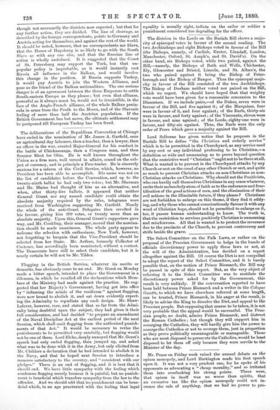Flogging in the British Service, whatever its merits or demerits,
has obviously come to an end. Mr. Gorst on Monday made a bitter speech, intended to place the Government in a dilemma, in which he recalled all the declarations which Mem- bers of the Ministry had made against the practice. He sug- gested that her Majesty's Government, having got into office by " inflaming the minds of the residuum" against flogging, were now bound to abolish it, and sat down evidently expect- ing the Admiralty to repudiate any such design. Mr. Shaw- Lefevre, however, rose, and stated that so far from the Admi- ralty being doubtful -upon the subject, they had given it their full consideration, and had decided "to prepare an amendment of the Naval Discipline Act at the earliest period of the next Session, which shall omit flogging from the authorised punish- ments of that Act." It would be necessary to revise the punishments to be permitted very carefully, but flogging would not be one of them. Lord Elcho, deeply annoyed that Mr. Gorst's speech had only ended flogging, then jumped up, and asked what was to be done with it in the Army, but only elicited from Mr. Childers a declaration that he had intended to abolish it in the Navy, and that he hoped next Session to introduce a measure satisfactory to the country, and "consistent with our pledges." There is an end of flogging, and it is best that it should end. We have little sympathy with the feeling which condemns flogging merely because it is painful, but no punish- ment is beneficial which transfers sympathy from the law to the offender. And we should add that no punishment can be bene- ficial which, in an age penetrated with the feeling that legal equality is morally right, inflicts on the sailor or soldier a punishment considered too degrading for the officer.


































 Previous page
Previous page